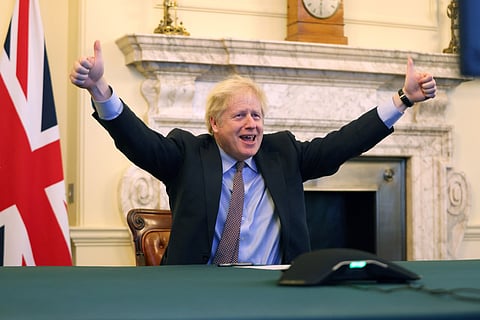

Britain clinched a historic deal with the European Union on Thursday as both sides managed to thrash out a post-Brexit free trade agreement (FTA) just days before the December 31 deadline. Thousands of pages of legal text accompanies the deal, with details of the agreement set to emerge in the course of the next few days, including the final ratification of the FTA by Parliaments on both sides.
"The deal is done," was the message posted on social media alongside an image of a jubilant Prime Minister Boris Johnson with his arms in the air moments after news of a post-Brexit free trade agreement (FTA) hit the headlines.
He soon took to the podium at 10 Downing Street to declare that he had kept his promise to the British electorate, who had voted for Brexit in a referendum in June 2016 and then handed him a thumping majority in December 2019 on a manifesto that centred around getting Brexit done.
"We have concluded the biggest trade deal yet and delivered on what the British people voted for, said Johnson, visibly in much higher spirits than he has seemed at the briefings usually dominated by COVID-19 infection rates and tougher lockdown measures.
Declaring that the UK had taken back control of its "destiny, money, borders, laws and waters", Johnson hailed the new "comprehensive, Canada style, free trade deal" that will allow goods to be sold "without tariffs and without controls in the EU markets".
"We will be able to decide how and where we are going to stimulate new jobs and new homes in freeports and new green industrial zones. For the first time since 1973, we will be an independent coastal state with full control over our waters," he said.
On one of the main sticking points in the trade negotiations, he revealed that the fish transition period or status quo will last five and a half years, after which there is "no theoretical limit" to the amount of fish British fishermen can catch in the country's waters.
And, striking a conciliatory tone for the EU at the end of long-drawn and at times acrimonious talks, he added: "I think this deal means a new stability, and a new certainty in what has sometimes been a fractious and difficult relationship. We will be your friend, your ally, your support and let it never be forgotten your number one market. This country will remain culturally, historically, strategically, geologically attached to Europe."
Reflecting on the crucial turning point achieved with the new free trade agreement (FTA), Johnson said it would finally resolve a question that has bedevilled our politics for decades and allow the UK to forge ahead as a non-member of the 27-member economic bloc from January 1, 2021.
He also indicated that British MPs will be recalled to Parliament to ratify the deal by December 30, just a day before the Brexit transition period is due to end.
The UK had voted to leave the EU in a referendum in June 2016 and since then the contours of what that exit would exactly look like has dominated the politics of the country, bringing Johnson to power with a promise of leaving the bloc with an FTA that is beneficial to both sides.
The vote in favour of Brexit was a fairly close one and to those who voted against Brexit, Johnson sought to reassure them of a lucrative new trading relationship worth nearly 690 billion pounds a year.
"My message to everybody on both sides of that argument in 2016 is that it is now a long time behind us. This is a great new deal with a great new trading relationship and partnership that I think will bring prosperity to both sides," he said.
The agreement, which Johnson said runs into 500 pages, will now be read through in minute detail by all 27 EU member-countries and cross-party MPs in the UK before ratification of the terms of what a post-Brexit future will look like for both sides.
Significant changes are expected in various sectors of the economy but the fact that a deal has been agreed means these changes would be less damaging than a no-deal Brexit was likely to be.
Earlier, Downing Street announced the deal in a statement saying the UK can now take full advantage of the fantastic opportunities available to it as an independent trading nation, striking trade deals with other partners around the world.
"We have signed the first free trade agreement based on zero tariffs and zero quotas that has ever been achieved with the EU. The deal is the biggest bilateral trade deal signed by either side, covering trade worth GBP 668 billion in 2019," it said.
"The deal also guarantees that we are no longer in the lunar pull of the EU, we are not bound by EU rules, there is no role for the European Court of Justice and all of our key red lines about returning sovereignty have been achieved. It means that we will have full political and economic independence on 1st January 2021," Downing Street declared.
On the other side, the EU said it has a good deal to show for the "long and winding road".
"We have finally got a deal, a fair and responsible deal," European Commission President Ursula Von Der Leyen said at a press conference from Brussels.
"The EU rules and standards will be respected... the United Kingdom is a long-standing partner," she said, adding that while "parting was such sweet sorrow" it was time to look to the future as the UK is now classified as a "third country" in relation to the economic bloc.